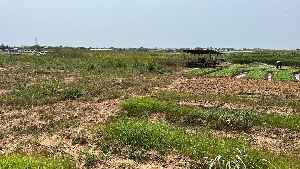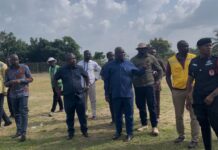A strategic partnership between the World Food Programme (WFP) and the Savannah Women Integrated Development Agency (SWIDA-Ghana), a women’s rights advocacy organization in Northern Ghana, is championing the transformation of degraded lands into productive farms at Nyansabga, a farming community in the Karaga District of the Northern Region.
The partnership, which began last year under the project dubbed Empowering Livelihoods and Building Community Resilience to Climate Shocks, is benefiting more than 100 women and adolescent girls, including other young men in the area.
The project is being implemented in collaboration with the Ministry of Food and Agriculture, and with support from the Department of Foreign Affairs and Trade (DFAT) of Australia.
As part of the implementation strategy, the project has established a climate-smart demonstration farm in the community, showcasing sustainable agricultural practices such as the planting of economic trees, including mango, baobab, and moringa, as well as vegetables like tomatoes, okro, and pepper.
Hajia Alima Sagito Saeed, Executive Director of SWIDAGhana, speaking to the media during a visit to the demonstration farm on Monday, said the initiative was designed to empower women to adopt climate-smart agricultural methods and replicate such practices on other degraded lands available for farming in the communities.
She explained that the project aimed at reclaiming and restoring degraded lands while at same time helping women, especially young girls, create sustainable assets for themselves.
“Because of the impact of climate shocks in the communities, we have secured a portion of the degraded lands for demonstration to show that climate-resilient agriculture is possible with the right technology and sustainable practices,” Hajia Sagito Saeed said.
She called for sustainable power supply solutions, including solar energy, to help stabilize all-year-round farming to address poverty, hunger, deprivation, and domestic-related violence.
Musah Abdul-Samed, Agriculture Officer for the project in Nyansabga, said the initiative had adopted climateresilient techniques such as soil conservation and a mechanized borehole for all-year farming.
He added that six experimental fishponds had been established under the project, each stocked with 250 fingerlings, meant to serve as demonstration hub to diversify livelihoods and improve nutrition in future.
He added that the project also uses furrow irrigation technology, which channels drained water from the fishponds to the farm, keeping it productive even during drought.
Madam Suweiba Abukari, leader of the women in Nyansabga, said proceeds from the farm had not only improved the nutritional needs of participating households but also provided financial support.
She noted that the women had established village savings and loans schemes through the initiative, boosting their economic rights and independence.
Madam Memunatu Alhassan, another beneficiary, told the GNA that, “Hitherto, | did not know one could rear fish in a pond, but thanks to WFP, SWIDA-Ghana and partners, we have been able to successfully operate a fishpond and the benefits are enormous, including nutrition for our children.”
A Ghana News Agency observation of other nearby farms revealed stunted crops compared to the lush demonstration farm, underscoring the need for climate-resilient practices to promote sustainable agriculture.
The project is expected to serve as a model for reclaiming degraded lands and building resilience against climate shocks in northern Ghana.








